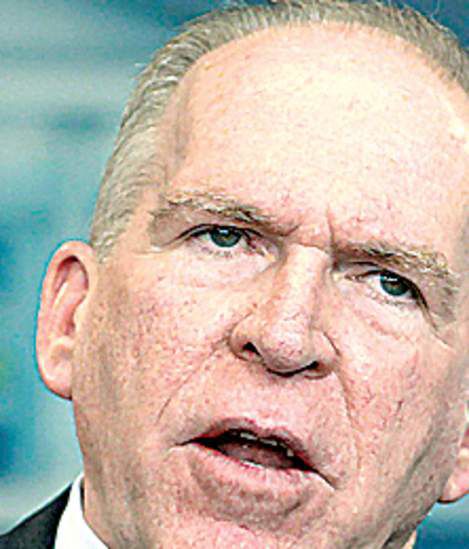Obama adviser outlines plans to defeat al-Qaida
Published 5:00 am Thursday, June 30, 2011

- White House counterterrorism chief John Brennan noted threats from Pakistan and Yemen.
WASHINGTON — A week after President Barack Obama announced the initial drawdown of U.S. troops from Afghanistan, his top counterterrorism adviser described plans to rely more heavily on a largely clandestine campaign to destroy al-Qaida’s network, which he described as already “in its decline.”
The adviser, John Brennan, said Wednesday that military and intelligence operatives would deliver “targeted, surgical pressure” on militant groups intent on attacking the United States. Laying out the Obama administration’s strategy to battle al-Qaida in the era after Osama bin Laden and at a time of declining public support for costly wars, Brennan outlined a counterterrorism strategy that formalized an approach that had been evolving over the past several years.
He talked of hitting al-Qaida “hard enough and often enough” with increased numbers of Special Operations forces and speedy deployments of “unique assets” (presumably drone aircraft), and he underscored that military commandos and intelligence operatives were working more closely than ever before on the battlefield.
“It will take time, but make no mistake, al-Qaida is in its decline,” he said in a speech at the Paul H. Nitze School of Advanced International Studies.
But this strategy — relying on often unreliable allies, sometimes sketchy intelligence and a clandestine U.S. force already strained by a decade of secretive wars — has its limitations, U.S. officials have said in recent days.
Brennan acknowledged as much in his remarks, noting the collapsing government in Yemen and the United States’ deteriorating relationship with Pakistan. Although he said that the United States must remain committed to Pakistan, Brennan voiced exasperation at one point, saying, “I’m hoping that the Pakistani people and the services are going to realize this really is a war.”
He said that the terrorist threat emanating from both countries was so serious that the United States had little choice but to deliver aid and military support to bolster its faltering counterterrorism partners.
The bin Laden raid has further fractured America’s already shaky alliance with Pakistan, and top military commanders are convinced that some of Pakistan’s military and intelligence services continue to provide financial and military support to groups like the Taliban and other militants in Afghanistan.
The officer who commanded the raid, Vice Adm. William McRaven, told senators Tuesday that he believed that Mullah Muhammad Omar, the Taliban’s leader, was hiding in Pakistan.
“I believe that the Pakistanis know that he is in Pakistan,” he said, but he did not specify whether he believed that Pakistan’s government was harboring the Taliban leader or simply had been unable to find him.
McRaven, the commander of the military’s clandestine Special Operations forces, said that pulling thousands of U.S. ground troops out of Afghanistan would place further pressure on Navy SEAL units and other commandos who will be called on to carry out secret missions. A reminder of the continued violence in Afghanistan came hours after his testimony, when militants attacked an Afghan hotel in Kabul on Tuesday night.
McRaven also told senators that military operations in Yemen and Somalia were constrained by limited numbers of intelligence and surveillance aircraft, like Predator drones.
Brennan, at times sounding triumphal during his 35-minute speech, said that the U.S. and allied counterterrorism operations had made it harder for al-Qaida to recruit new fighters, raise money and communicate.
Over the past 2 1/2 years, he said, al-Qaida’s leadership has been “decimated” and virtually every affiliate has lost a top leader or operational commander.
Despite such successes and some public sentiment that bin Laden’s death ends the threat from al-Qaida, Brennan said the United States and its allies must keep the pressure on terrorist networks.
“If we hit al-Qaida hard enough and often enough, there will come a time when they simply can no longer replenish their ranks with the skilled leader that they need to sustain their operations,” he said.
Brennan’s speech highlighted themes contained in a 19-page document, “National Strategy for Counterterrorism,” which the White House released Wednesday. It replaces a counterterrorism strategy that President George W. Bush approved in 2006.
Obama administration officials have implicitly criticized Bush’s “global war” on terrorism as lacking focus on what aides to President Barack Obama say are the main threats to the United States: al-Qaida in Afghanistan and Pakistan; its regional affiliates in Yemen, Somalia and northern Africa; and individual followers who are increasingly inspired by videos and violent extremist sermons over the Internet.
“Precisely because its leadership is under such pressure in Afghanistan and Pakistan, al-Qaida has increasingly sought to inspire others to commit attacks in its name,” the strategy document said.
Brennan said the administration would announce this summer its approach on combating violent extremism in the United States.
Juan Zarate, a senior counterterrorism official under Bush, said that by narrowing its counterterrorism focus to al-Qaida, its affiliates and individual followers, the Obama administration underestimated the power of al-Qaida’s ideology.
“To narrow the focus has the potential to inadvertently blind us to the underlying ideological struggle that still exists as well as to terrorist threats on the horizon that neither begin nor end with al-Qaida,” Zarate said. “This focus also inadvertently aggrandizes al-Qaida at a time when we want to emphasize its irrelevance.”






